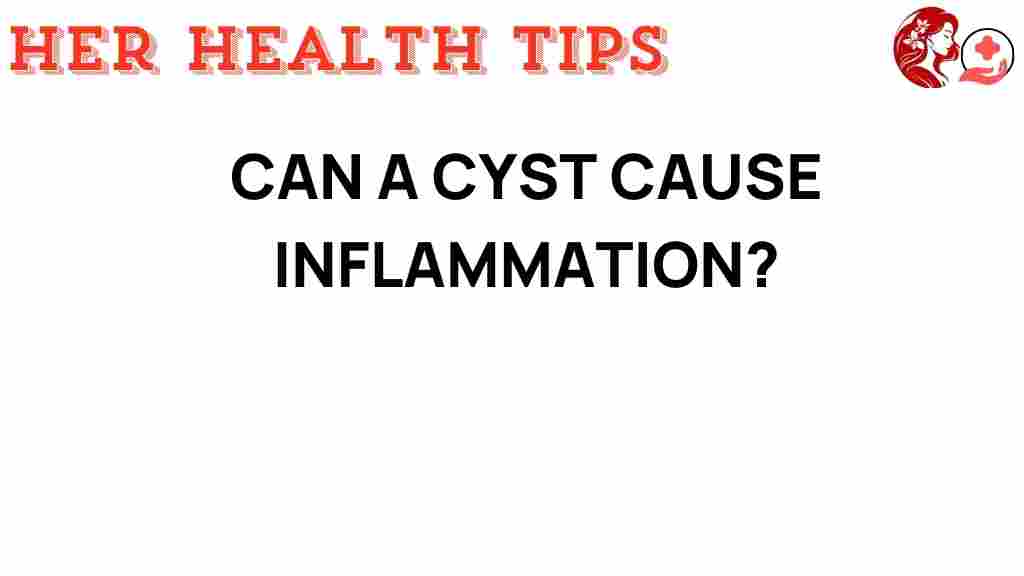Unraveling the Mystery: Can a Cyst Cause Inflammation?
Cysts are common occurrences in the human body, often misunderstood and sometimes feared. Many people wonder if a cyst can cause inflammation. Understanding the relationship between a cyst and inflammation is crucial for your health and wellness. In this article, we will explore what cysts are, how they can lead to inflammation, the symptoms associated with these conditions, methods of diagnosis, and available treatment options.
Understanding Cysts
A cyst is a closed sac-like structure that can be filled with fluid, semi-solid material, or gas. Cysts can form in various tissues of the body and can vary greatly in size, from microscopic to several centimeters in diameter. Here are some key points about cysts:
- Types of Cysts: There are several types of cysts, including sebaceous cysts, ovarian cysts, and ganglion cysts.
- Causes: Cysts can form due to a variety of reasons such as infections, blockages in ducts, or chronic inflammation.
- Occurrence: Cysts can develop in almost any organ, including the skin, ovaries, kidneys, and liver.
The Link Between Cysts and Inflammation
Inflammation is the body’s response to injury or infection, and it can manifest as redness, swelling, heat, and pain. Understanding whether a cyst can cause inflammation requires a closer look at how cysts interact with surrounding tissues.
How Cysts Can Cause Inflammation
In some cases, cysts can lead to inflammation due to:
- Infection: If a cyst becomes infected, it can cause significant inflammation and pain.
- Pressure on Surrounding Tissues: Large cysts can press against nearby organs or tissues, leading to irritation and inflammation.
- Rupture: If a cyst ruptures, the contents can spill into surrounding tissues, triggering an inflammatory response.
Symptoms of Cysts and Associated Inflammation
Recognizing the symptoms of cysts and inflammation can be crucial for timely diagnosis and treatment. Common symptoms include:
- Pain: This may occur if the cyst is pressing on nerves or if it becomes infected.
- Swelling: Inflamed cysts may appear swollen or red.
- Fever: In cases of infection, a person may experience a fever.
- Drainage: Sometimes, cysts may leak fluid or pus if they become infected or rupture.
Diagnosis of Cysts and Inflammation
Diagnosing a cyst and determining whether it is causing inflammation involves a series of steps:
Step-by-Step Diagnostic Process
- Medical History: Your doctor will begin by taking a detailed medical history, including any symptoms you are experiencing.
- Physical Examination: A physical exam may reveal swelling or tenderness in the area of the cyst.
- Imaging Tests: Ultrasound, CT scans, or MRI may be used to visualize the cyst and assess its characteristics.
- Laboratory Tests: If an infection is suspected, blood tests and cultures may be conducted to identify any pathogens.
Treatment Options for Cysts and Inflammation
Treatment for cysts and the inflammation they may cause can vary depending on the type of cyst and the severity of symptoms. Possible treatment options include:
- Observation: If the cyst is small and asymptomatic, a “watch and wait” approach may be adopted.
- Medication: Anti-inflammatory medications or antibiotics may be prescribed if inflammation or infection is present.
- Drainage: In cases of large or infected cysts, a doctor may perform a procedure to drain the cyst.
- Surgery: Surgical removal of the cyst may be necessary for large, painful, or recurrent cysts.
Wellness and Preventative Measures
Maintaining overall health can help reduce the risk of developing cysts and associated inflammation. Here are some wellness tips:
- Stay Hydrated: Drinking plenty of water aids in bodily functions and can help prevent blockages that lead to cyst formation.
- Healthy Diet: A balanced diet rich in fruits, vegetables, and whole grains supports overall health.
- Regular Exercise: Physical activity promotes good circulation and can enhance immune function.
- Routine Check-ups: Regular visits to your healthcare provider can help catch potential issues early.
Troubleshooting Tips for Managing Symptoms
If you are experiencing symptoms related to a cyst, consider the following troubleshooting tips:
- Monitor Symptoms: Keep a diary of your symptoms, noting any changes or triggers.
- Apply Heat or Cold: Using a warm compress may help alleviate pain, while ice can reduce swelling.
- Avoid Irritation: Try to avoid activities that may aggravate the cyst, such as tight clothing or excessive movement.
- Consult a Healthcare Provider: Always seek professional medical advice if symptoms worsen or do not improve.
Conclusion
Understanding the relationship between a cyst and inflammation is vital for your health. While many cysts are benign and asymptomatic, they can sometimes lead to inflammation and other complications. Recognizing the symptoms, seeking timely diagnosis, and exploring treatment options can help you manage your condition effectively.
For further reading on cysts and inflammation, you may find this medical research article insightful. Remember, your health and wellness are paramount, and staying informed is the first step toward taking control of your health.
If you want more information on related health conditions, feel free to visit our wellness resources.
This article is in the category Conditions and created by HerHealthTips Team
